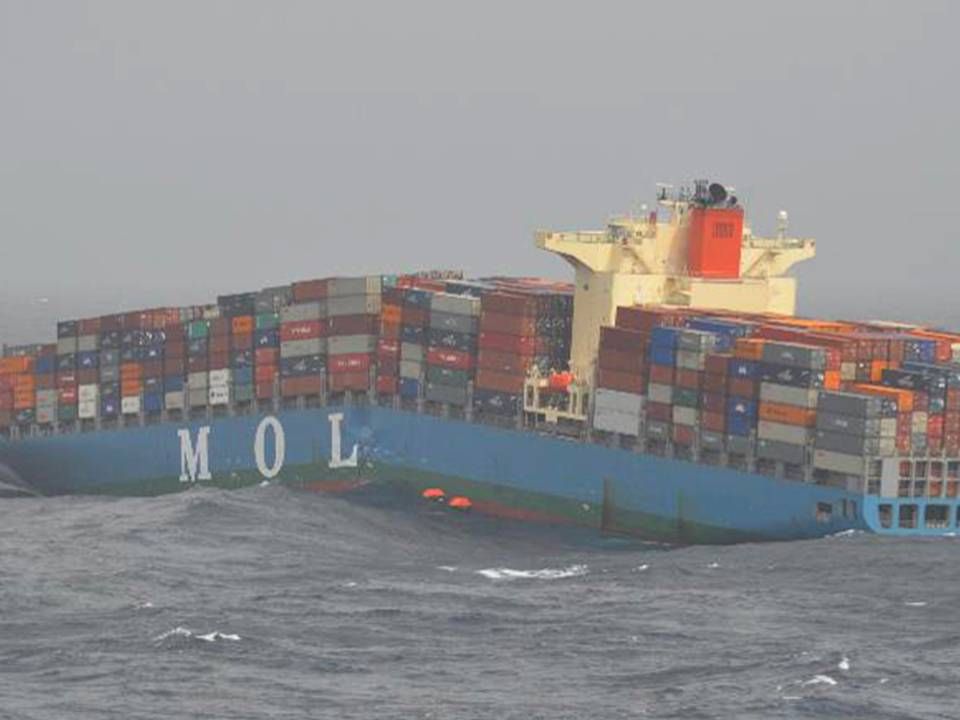Skuld aiming for USD 1 billion revenue by 2020

OSLO:
In less than one year 39-year-old Ståle Hansen will replace Douglas Jacobsohn as CEO of Norwegian insurance company Skuld, where he is currently serving as CFO. And the new CEO can look forward to quite a task in an industry that finds itself in the midst of a transitional phase, with increasing environmental requirements and much more expensive damages, symbolized by the Costa Concordia accident in 2012.
Skuld itself holds towering growth ambitions for the company, he says in an interview with ShippingWatch at the offices in Rådhusgaten, Oslo. Next door to the Norwegian Shipowners' Association and with a view to Akers Brygge, home to several of Oslo's shipping companies, including John Fredriksen's Frontline and Golden Ocean.
"We have an ambition ahead of 2015 of reaching a USD 500 million premium volume at Skuld. And then we have an ambitious plan ahead of 2020, where we aim to double this volume to USD 1 billion," says Ståle Hansen about the company's strategy on the short and a bit longer term.
Owners should not pay
Asked how Skuld plans to realize the ambition of a USD 1 billion revenue, Ståle Hansen stresses that this is not something that must be done at all costs.
"It's an ambitious goal. That's not to say that we have to achieve it. We're not prepared to buy business by pricing ourselves too low, as that would produce a lower result over time. So we have to grow profitably, and we're going to do that by growing together with our shipowners by offering innovative products and finding new solutions for protecting them efficiently against the damages and accidents that can arise. We have to be commercially creative in finding completely new solutions, entering new markets," he says.
This means that Skuld is working on a diversification strategy where the company is looking for new business areas in which it can provide profitable products, so as to avoid asking shipowners - and thus owners - for more money.
"Our shipowners have also been through very demanding times and there's a limit to how much money they have and are willing to pay to an insurance company. They want the company to be balanced and contribute to each other's damages in the collaboration they get from being part of a P&I club. They generally don't want to tie up more money in Skuld by increasing the premium just to satisfy an external capital requirement from the Financial Supervision Authority. It's important to emphasize that we're going to grow by diversifying and being innovative," says Ståle Hansen.
New Markets
The increasing volume will come from growth in members and the owner portfolio as well as from the new commercial platforms that fall under, for instance, Lloyd's syndicate Skuld 1897, which was established in 2011 and offers a series of products for the marine and energy markets, including damage insurance, loss of hire, cargo insurance, etc.
As for new markets, Ståle Hansen points to the offshore and energy markets, where Skuld is experiencing considerable growth by finding solutions for companies operating oil rigs and other offshore installations as well as ships, systems and solutions for supporting operations on new energy markets such as offshore wind. Both Asia and South America are showing significant growth, he says.
One of Skuld's successful criteria has turned out to be establishing offices in local markets. For instance, two years ago Skuld opened an office in Singapore with six employees, which will grow to 12 people over time, says Ståle Hansen. Here the company has invested in the office and established a Skuld branch, so that the office is able to provide underwriting and is licensed by local authorities. Though the office is young it is already contributing solidly to Skuld's revenue:
"Now it's only been two years, so there's still a gradual buildup, it's at the top end of five percent today and it's going to grow to ten percent before long, which is quite a lot. This is because we also have a lot of offshore activity at this office, activity that we used to handle in Oslo but which is now handled in local markets."
Rating matters
He explains that growth has naturally always been part of Skuld's strategy, but that this was made even more concrete following the EU directive Solvens II, which all insurance companies in the EU and European Economic Areas will have to comply with from 2016, and which introduces new requirements for the insurance industry's capital due to the fact that the companies are engaged in the risks that apply to the business. Skuld is also rated by Standard & Poors, where it currently holds a credit rating of A.
"This rating says a great deal about the financial strength of Skuld, and our shipowners and commercial customers look at this when they are buying insurance. Here they want a company with a solid credit rating. If you hold a rating below A- you might not even come into consideration," says Ståle Hansen, adding:
"As such, we're working toward reaching a size that Standard & Poors expects of an A rated company."
That Skuld currently holds an A rating is quite remarkable, as the rating bureau points out that it normally expects an A rated insurance company to have a revenue of around USD 1 billion, and Skuld is not even close to this level today:
"We're going to land at around USD 420 million this year," says Ståle Hansen.
Could you risk losing your A rating if you do not reach USD 1 billion?
"No, we don't, as long as we maintain our solidity. Standard & Poors also looks at other criteria, such as having a solid underwriting - that is, a good control of the risks you take. And in this aspect Skuld stands apart from the competition, as we have managed to keep our insurance technical finances positive for the 11th year in a row. We have a positive result on our underwriting. Many insurance companies are struggling with this year after year because the damages become too great," says Ståle Hansen.
Skuld: Wreck salvaging often much more costly than assumed
Asia boosts Skuld's business by 13 percent
Related articles
Skuld: Wreck salvaging often much more costly than assumed
For subscribers
Asia boosts Skuld's business by 13 percent
For subscribers
IUMI: Hull damages drop to record low
For subscribers




















